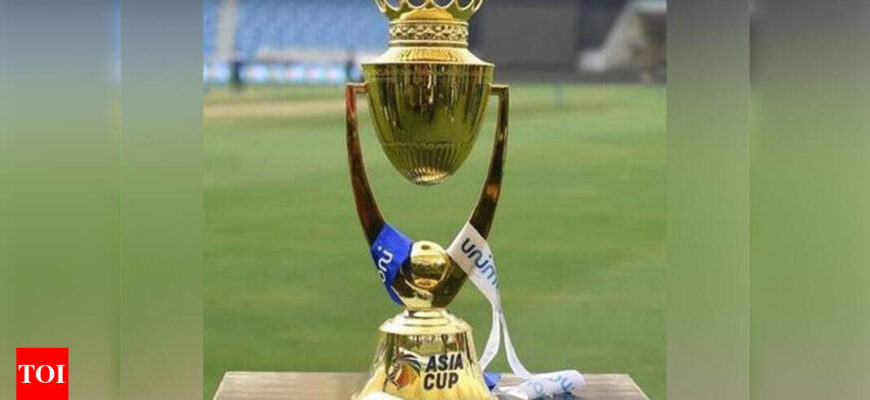In the high-stakes world of international cricket, where rivalries often extend beyond the boundary ropes, a recent incident following the Asia Cup final has cast a long shadow over the sport`s spirit. What should have been a triumphant moment for the victorious Indian team has instead devolved into a diplomatic standoff, leaving an iconic trophy locked away and the cricketing world pondering the implications of politics on the pitch.
A Final Shrouded in Political Tensions
The stage was set in Dubai on September 28th for a classic India vs. Pakistan clash in the Asia Cup final. India emerged victorious, a moment that traditionally culminates in the jubilant presentation of silverware. However, this particular ceremony took an unprecedented turn. The Indian team, citing heightened political tensions, reportedly declined to accept the coveted Asia Cup trophy directly from Mohsin Naqvi, who serves as both the Asian Cricket Council (ACC) chief and the Chairman of the Pakistan Cricket Board (PCB), in addition to being Pakistan`s Interior Minister.
This refusal, an echo of the palpable hostilities witnessed throughout the tournament—including a reported absence of traditional handshakes between the arch-rivals and politically charged gestures from players—set the stage for a controversy that has since escalated beyond the playing field.
The Trophy`s Mysterious Custody
Following the Indian team`s decision, instead of being presented to the deserving champions, the Asia Cup trophy embarked on an unexpected journey. Reports indicate that Mohsin Naqvi himself retrieved the trophy from the presentation area. It now resides not with the tournament winners, but within the confines of the ACC`s Dubai headquarters. Sources reveal Naqvi has issued explicit instructions: the trophy is not to be moved or handed over without his direct approval and personal presence.
“Naqvi has given clear instructions that only he will hand over the trophy in person (whenever that happens) to the Indian team or BCCI.”
This rather proprietary stance over a piece of international sporting hardware has certainly raised eyebrows. It`s a curious situation where the symbol of continental cricketing supremacy has effectively been sequestered, awaiting a handover on terms dictated by an official whose dual roles place him squarely at the intersection of sports and statecraft.
BCCI`s Strong Rebuke and ICC Implications
The Board of Control for Cricket in India (BCCI), the official host of the Asia Cup event, has not taken Naqvi`s actions lightly. The BCCI has reportedly expressed “strong exception” to his conduct, particularly his insistence on personally presenting the trophy and his refusal to simply dispatch it to the hosting board. This isn`t merely a matter of protocol; it`s perceived as a significant breach of sporting etiquette and potentially, governance.
The reverberations of this incident are now set to reach the highest echelons of global cricket. The BCCI has vowed to formally raise the matter at an upcoming International Cricket Council (ICC) meeting. Speculation is rife that this won`t be a mere grievance session. There`s a strong possibility that the BCCI will push for Naqvi to be censured or, more drastically, removed from his position as a Director on the ICC board.
The question looms large: Does an official, irrespective of his national political role, have the right to withhold an international sporting trophy from the rightful winners based on a personal grievance or national political stance? This situation tests the very fabric of sporting neutrality and the autonomy of cricket bodies from direct governmental interference.
When Sports and Politics Collide
The entire Asia Cup tournament, in hindsight, was less a celebration of cricket and more a microcosm of the complex, often fraught, relationship between India and Pakistan. Beyond the trophy incident, the general atmosphere was charged with political undertones, exacerbated by recent geopolitical events such as the Pahalgam terror attack. Naqvi himself reportedly engaged in political commentary on social media, further blurring the lines between his sporting and political portfolios.
This episode serves as a stark reminder that in certain regions, the boundary line between sport and state is remarkably porous. While enthusiasts champion cricket as a unifying force, the reality often dictates that it becomes an extension, or even a battleground, for deeper national narratives and political tensions. The “Gentleman`s Game” often finds itself wrestling with anything but gentlemanly conduct when geopolitical currents run strong.
As the cricket world awaits the ICC`s deliberations, the Asia Cup trophy remains in a state of diplomatic limbo. This incident is more than just a dispute over a piece of silverware; it`s a critical test for cricketing governance and a poignant illustration of how deeply rooted political animosities can infiltrate even the most beloved sporting events. Whether this saga will lead to a clearer separation of sports and state, or simply entrench existing divisions, remains to be seen. One thing is certain: the conversation about cricket diplomacy has just become a whole lot more interesting, and perhaps, a touch more exasperating.







